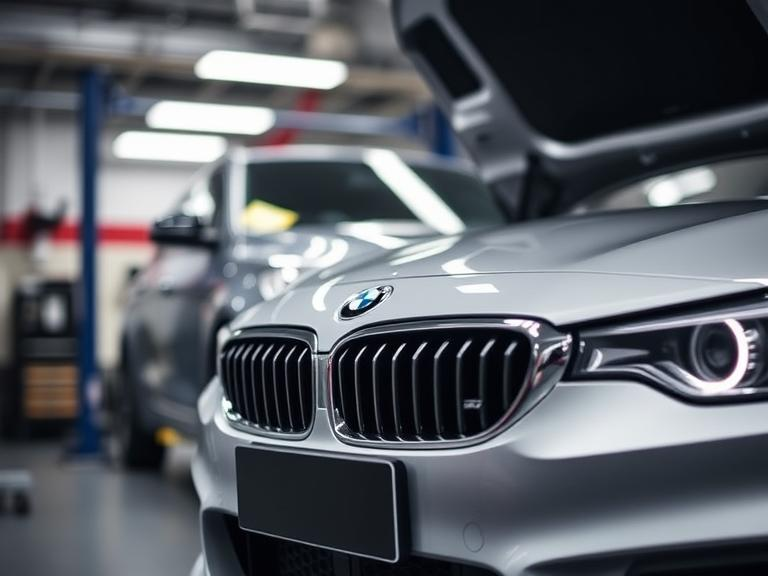If you own a BMW and wonder why your brakes occasionally feel unresponsive or emit strange sounds, you’re not alone. This guide demystifies BMW brake systems, explains how to identify issues, and outlines practical solutions—whether you’re navigating Berwick’s hills or cruising through Melbourne. We’ll cover everything from recognizing early warning signs to choosing between repairs and replacements, all while prioritizing safety and performance.

BMW Brake System Basics
BMW brake systems blend precision engineering with robust materials to deliver responsive stopping power. Unlike standard vehicles, BMWs use components designed for high-speed stability and repeated heavy braking. This sophistication ensures safety during spirited drives but demands specialized knowledge for maintenance and repairs.
Key Components of a BMW Brake System
A BMW’s braking relies on four core elements:
- Brake Pads: High-friction material (often ceramic or semi-metallic) that presses against rotors. BMW-specific pads handle heat better but wear faster under aggressive driving.
- Rotors (Discs): Ventilated or slotted discs dissipate heat quickly. Performance models like M Series use composite rotors to resist warping.
- Hydraulic System: Brake fluid transfers pedal pressure to the calipers. BMWs require low-viscosity DOT 4 or DOT 5.1 fluid for optimal performance.
- Sensors: Electronic wear sensors trigger dashboard alerts when pads thin beyond 3mm, preventing rotor damage.
These components work seamlessly during braking: pressing the pedal activates the master cylinder, forcing fluid through lines to squeeze calipers against rotors. Advanced systems include ABS (Anti-lock Braking) and DSC (Dynamic Stability Control), which modulate pressure during skids or hard stops.
How Do I Know If My BMW Brakes Need Replacing?
Watch for these signs:
- Squealing/Grinding: High-pitched noise indicates worn pads; grinding suggests metal-on-metal contact.
- Spongy Pedal: Air in hydraulic lines or low fluid reduces responsiveness.
- Vibration: Warped rotors cause steering wheel shudder during braking.
- Warning Lights: A yellow brake icon signals thin pads; red alerts denote fluid leaks or system failure.
Ignoring these can lead to rotor scoring or hydraulic failure. For Berwick drivers navigating Clyde Road’s slopes, prompt attention is non-negotiable.
Recognising Common Brake Issues
BMW brakes excel under stress but develop distinct symptoms when compromised. Early detection prevents costly repairs and accidents.
Strange Noises, Screeching, and Grinding Sounds
Noises stem from three common issues:
- Wear Indicators: Embedded metal tabs screech when pads reach 3mm thickness.
- Glazed Pads/Rotors: Overheating hardens pad material, creating a high-frequency squeal.
- Contamination: Road grit or rust buildup between pads and rotors causes grinding.
Pro Tip for Berwick Drivers: Morning dew on Dandenong-Cranbourne roads accelerates rotor rust. Gentle braking for the first 2km clears surface corrosion.
Brake Warning Lights: What They Mean
Dashboard symbols vary by severity:
- Yellow Brake Circle: Pad wear or low fluid. Schedule inspection within 1–2 weeks.
- Red Brake Circle: Critical fluid loss or pressure failure. Stop driving immediately.
- ABS/DSC Lights: Fault in stability systems. Brakes work but may lock on wet roads.
Leaking Brake Fluid: When to Seek Immediate Help
Leaks manifest as:
- Puddles near wheels (clear/yellow or brown fluid).
- Rapid fluid reservoir depletion.
- Sudden pedal sink.
Causes include cracked hoses, failing master cylinders, or caliper seal degradation. For Berwick’s rainy climate, leaks heighten accident risks—seek urgent repairs.
Repair vs Replacement: What’s the Right Choice?
Choosing between fixes hinges on damage extent, driving habits, and cost.
When Is a Simple Repair Enough?
Minor issues often need quick adjustments:
- Squeak Elimination: Applying copper grease to pad shims reduces vibration noise.
- Rotor Resurfacing: Machining smooths warping if thickness remains above BMW’s minimum (e.g., 28mm for 3 Series).
- Fluid Flush: Replacing moisture-contaminated fluid restores pedal firmness.
These repairs cost $150–$400 in Australia and suit pads/rotors with >50% life remaining.
Signs It’s Time for a Full Brake Replacement
Opt for new components if you notice:
- Rotor thickness below spec or deep grooves.
- Pads worn to 1–2mm.
- Persistent vibration after resurfacing.
- Brake fade (reduced stopping power) during repeated hard stops.
Performance drivers in Berwick’s hills benefit from upgraded parts like drilled rotors or carbon-ceramic pads.
Why Are BMW Brake Parts Often More Expensive?
Three factors elevate costs:
- Material Quality: OEM rotors use boron-alloy steel; pads contain heat-resistant compounds.
- Precision Engineering: Components must match BMW’s tight tolerances to avoid calibration errors.
- Integrated Electronics: Wear sensors and DSC-compatible designs add complexity.
Genuine BMW parts cost 20–40% more than aftermarket but offer longer warranties and perfect compatibility.
Cost Considerations in Australia
Brake service pricing varies by model, parts, and location. Berwick workshops often charge less than CBD dealers but verify their BMW expertise.
Average Repair Prices for BMW Brakes Down Under
| Service | Genuine Parts (AUD) | Premium Aftermarket (AUD) |
|---|---|---|
| Pad Replacement (Front) | $350–$550 | $250–$400 |
| Pad & Rotor Replacement (Front) | $900–$1,600 | $700–$1,200 |
| Fluid Flush | $180–$250 | $150–$200 |
Note: M Series models cost 30–50% more due to larger components.
Factors That Can Influence Costs
- Model Complexity: X5/X7 SUVs require heavier-duty parts than 1 Series.
- Labour Rates: Berwick mechanics average $110–$140/hour; dealerships charge $160–$220.
- Parts Origin: Genuine BMW pads/rotors include 2-year warranties. EU-sourced aftermarket brands (e.g., ATE, Brembo) offer reliability at lower prices.
- Add-Ons: Sensor or caliper replacements add $100–$400.
How Much Does It Cost to Replace Pads and Rotors?
A full axle replacement ranges:
- Non-M Models: $800–$1,200 (aftermarket) or $1,100–$1,600 (OEM).
- M Models: $1,400–$2,500.
Berwick Tip: Bundle brake service with annual maintenance for labour discounts.
Maintaining and Extending the Life of Your BMW Brakes
Proactive care prevents 70% of major brake failures. Follow BMW’s schedules and adapt to local conditions.
Regular Servicing: How Often Should It Be Done?
- Pads/Rotors: Inspect every 15,000km; replace every 50,000–70,000km.
- Brake Fluid: Flush every 2 years (or 30,000km).
- Calipers/Lines: Check for leaks or corrosion during tire rotations.
Berwick’s mix of urban and hilly driving accelerates wear—consider 10,000km checks if you frequent Princes Highway.
Tips to Minimise Brake Wear and Fade
- Drive Smoothly: Coast to decelerate; avoid tailgating.
- Downshift: Use manual/sport mode on Clyde Road descents to reduce brake load.
- Clean Wheels: Remove debris stuck between pads/rotors weekly.
- Quality Fluids: Use only BMW-approved DOT 4+/5.1 fluids.
BMW Brake Service in Berwick: Local Insights
Berwick’s terrain demands resilient brakes. The area’s elevation changes test fade resistance, while frequent rain increases corrosion risks. Workshops like those near High Street specialize in BMWs, offering:
- Terrain-Tuned Upgrades: Thicker rotors or hydrophobic pads for wet conditions.
- Diagnostic Scanners: BMW-specific tools reset wear sensors and calibrate DSC.
- Loaner Cars: Minimize downtime during multi-day services.
Choose mechanics with BMW certifications (e.g., Bosch Master Technicians) and genuine parts inventories.
Frequently Asked Questions
Why Do My BMW Brakes Squeak Even After New Pads?
Squeaking post-replacement stems from:
- Improper bedding (new pads need 300km of gradual stops).
- Missing anti-rattle clips.
- Low-metallic pads, which naturally noise under light braking.
Are Aftermarket Parts Safe for BMW Brake Repairs?
Reputable brands (e.g., Textar, Jurid) meet OEM specs. Avoid unbudgeted “performance” pads—BMW’s DSC may misread friction levels.
Is It Dangerous to Drive With Worn-Out Brake Pads?
Yes. Worn pads:
- Double stopping distances.
- Overheat rotors, causing cracks.
- Damage calipers, escalating repair costs.
Do Run-Flat Tyres Affect Brake Performance?
Run-flats’ stiff sidewalls reduce flex, slightly increasing stopping distances. Maintain 36–38 PSI pressure to offset this.
Choosing the Right Brake Service Provider
Independent Specialists vs BMW Dealerships
| Factor | Dealerships | Independent Specialists |
|---|---|---|
| Cost | 20–40% higher | Competitive |
| Parts | Genuine BMW only | OEM or quality aftermarket |
| Expertise | Factory-trained | BMW-focused experience |
| Convenience | Software updates | Personalized service |
What to Look for in a Trustworthy Mechanic
- Certifications: BMW STEP or Bosch qualifications.
- Transparency: Itemized quotes with part numbers.
- Warranties: Minimum 12 months on labour/parts.
- Loaner Cars: Essential for lengthy repairs.
Top Berwick shops include those with European specializations and onsite machining tools.
Beginner’s Guide to Understanding BMW Brake Repairs: Conclusion
Mastering BMW brake maintenance ensures safety across Berwick’s diverse roads—from suburban lanes to Beaconsfield highways. Recognize early warnings like squeals or soft pedals; prioritize fluid checks and timely pad replacements. While genuine parts command higher prices, their precision engineering justifies the investment for peak performance. Partner with local specialists who understand BMW’s intricacies, and never compromise on critical repairs. With this knowledge, you’ll navigate braking challenges confidently, extending your BMW’s lifespan and driving pleasure.



